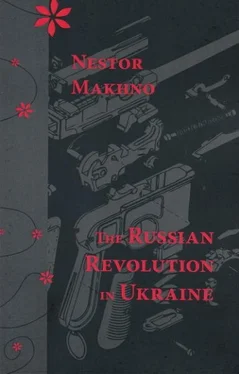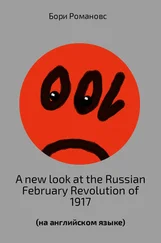Nestor Makhno - The Russian Revolution in Ukraine
Здесь есть возможность читать онлайн «Nestor Makhno - The Russian Revolution in Ukraine» весь текст электронной книги совершенно бесплатно (целиком полную версию без сокращений). В некоторых случаях можно слушать аудио, скачать через торрент в формате fb2 и присутствует краткое содержание. Город: Edmonton, Год выпуска: 2007, Издательство: Black Cat Press, Жанр: Биографии и Мемуары, на английском языке. Описание произведения, (предисловие) а так же отзывы посетителей доступны на портале библиотеки ЛибКат.
- Название:The Russian Revolution in Ukraine
- Автор:
- Издательство:Black Cat Press
- Жанр:
- Год:2007
- Город:Edmonton
- ISBN:нет данных
- Рейтинг книги:5 / 5. Голосов: 1
-
Избранное:Добавить в избранное
- Отзывы:
-
Ваша оценка:
- 100
- 1
- 2
- 3
- 4
- 5
The Russian Revolution in Ukraine: краткое содержание, описание и аннотация
Предлагаем к чтению аннотацию, описание, краткое содержание или предисловие (зависит от того, что написал сам автор книги «The Russian Revolution in Ukraine»). Если вы не нашли необходимую информацию о книге — напишите в комментариях, мы постараемся отыскать её.
The Russian Revolution in Ukraine
The Russian Revolution in Ukraine — читать онлайн бесплатно полную книгу (весь текст) целиком
Ниже представлен текст книги, разбитый по страницам. Система сохранения места последней прочитанной страницы, позволяет с удобством читать онлайн бесплатно книгу «The Russian Revolution in Ukraine», без необходимости каждый раз заново искать на чём Вы остановились. Поставьте закладку, и сможете в любой момент перейти на страницу, на которой закончили чтение.
Интервал:
Закладка:
So passed these troubled days…
On the next day I went with several artillery specialists to the Gulyai-Pole railway station to inspect what we had received from Belenkevich’s headquarters. We saw six cannons (four of the French kind and two Russian howitzers), three thousand rifles, two wagons of cartridges, and nine wagons of ammunition for the cannons.
Our joy was indescribable. We immediately transported what was urgently needed to the Revkom for distribution to the companies. Then we prepared to leave for the front to fight the Central Rada and its allies, the German and Austro-Hungarian emperors.
The appeal launched by the Revkom of Gulyai-Pole, the Soviet, and the Anarchist Communist Group, inviting the toilers of the raion to quickly form battalions of volunteers to fight the counter-revolutionaries, came to the attention of the headquarters of the Red Guards who immediately sent by special train an envoy to meet with me and find out what forces the Revkom of our proud raion could muster and when these troops, inspired by anarchist ideals, could be sent to the front.
I met with with him on the night of April 8, 1918, at the same moment when Lenin and Trotsky were having a discussion in the Kremlin about annihilating the anarchists groups, first in Moscow, then in the whole of Russia (they had already lost interest in Ukraine and so didn’t touch the anarchists there). I found the envoy from the Red Guard headquarters in Ekaterinoslav was distressed by the fact that the Red Guard detachments, in accord with the Treaty of Brest-Litovsk, were being withdrawn from the front lines of the revolutionary front in the direction of the Russian border, while the detachments made up of Ukrainian toilers, hastily organized, were not yet ready for combat and were falling back everywhere. I assured him that I would do everything possible to ensure that our troops would be advancing on the morrow to the Front.
After this envoy had left, I received news that the Red Guards had also retreated in the Aleksandrovsk sector. The military command in Aleksandrovsk implored the Gulyai-Pole battalions to come to their aid. After consulting with the Revkom and the Anarchist Communist Group, I sent to Aleksandrovsk the detachment formed by the Anarchist Communist Group and a mixed battalion formed from the peasants of hamlets closest to Aleksandrovsk.
The detachment formed by the Anarchist Communist Group was a cavalry formation. The Red Guards had almost no cavalry. Our detachment was soon required in the Ekaterinoslav military sector. In due course it was also redeployed, on my orders, in the Chaplino sector. Meanwhile we successfully prepared the Gulyai-Pole, Konsko-Pazdorskij, Shanzharo-Turkenovskij, and other “free battalions” for action at the front.
Chapter 30
Egorov’s Urgent Summons; the Loss of Our Military Sector
It was a very tense moment. The Ukrainian nationalist organization seemed to be moribund. Its members didn’t say anything, they mostly just did what they were asked to do.
The artillery and infantry were tuned up. We intended to advance but didn’t have panoramic sights for our cannon. We sent a telegram to Belenkevich: could he not provide us with new panoramic sights? We didn’t get an answer. At night Ukrainian SRs — the agronomist Dmitrenko and two youths — the fanatical nationalists P. Kovalenko and Mikita Konoplya — cut all the telegraph and telephone wires outside of Gulyai-Pole. This deprived me of connections with the staff of the Red Army command. I made sure all the peasants were informed about this evil deed. After a few hours connections were re-established. I got word from Belenkevich that the panoramic sights and spare parts for the cannons and machine guns should be found in certain boxes in a certain railway car. Everything turned up and was distributed where needed. In the meantime proclamations of the Ukrainian socialists-nationalists appeared in Gulyai-Pole and throughout the raion explaining the alliance of the Central Rada with their German “brothers” who were helping the sons of Ukraine “liberate the Ukraine from the yoke of the katzaps”. This proclamation concluded with an appeal to the population to help the Central Rada and its German and Austro-Hungarian brothers finish off the enemy…
At the same time a rumour was spreading among the inhabitants of Gulyai-Pole to the effect that the German troops were destroying all the towns and villages in their path which offered resistance to them and the Central Rada. And, on the other hand, those citizens who co-operated with them were provided with all the necessities, including sugar, footwear, and textiles.
More and more often and loudly began to be heard among the population outbursts such as: “—and what if the Germans burn villages?… Then they will burn Gulyai-Pole!… What will happen to our children, our parents?!… ” And then one the agents of the Central Rada blurted out the word “delegation” which was quickly seized upon and repeated from one person to the next among the toilers of Gulyai-Pole.
This word attracted my attention. I called a meeting of the Revkom, the Soviet, and the A-K Group and proposed to publish an appeal headed by the following lines: “The soul of the traitor and the conscience of the tyrant are as black as the night in springtime”. I also wanted to organize a meeting to explain to the whole population of Gulyai-Pole the provocative meaning of the term “delegation”, etc.
At that very moment I learned that several supporters of the Central Rada had just arrived in Gulyai-Pole and were trying to convince the population that they had been made prisoners by the Bolsheviks while returning from the External Front but had succeeded in escaping. I also learned that under the direction of the father of one of these so-called escapees, Tikhon Byk, a delegation was being prepared to treat with the German command.
I therefore asked the comrades to organize the meeting as quickly as possible and went looking for Tikhon Byk. When I found him, I demanded an explanation of this “delegation”. He offered denials for a long time, but when he realized this was useless, he told me not to involve myself in this question: “It’s the people’s business.” I left him in peace, declaring that for such an action the people themselves would wring his neck and do the same to all those who tried to defend him.
The appeal was published and the meeting convened, a meeting at which everyone agreed on the necessity of an immediate departure for the front. During the meeting I received a telegram from the commander of a Red Guard detachment, Egorov, summoning me urgently to his headquarters on the Verkhnij Tokmak — Fedorovka railway line.
I had to make a hurried trip to Commune #1, of which I was a member. I had received a report that about ten drunken sailors had arrived there from the headquarters of the Red Army reserve forces. They had shot one of the members of the Commune. It was necessary to get them out of there without more bloodshed. I succeeded in convincing the sailors to leave. Then I went to the station of Pologi and took the train for Egorov’s headquarters.
Half way there I learned that he had withdrawn in the direction of Uzovo, so I travelled on the branch line Verkhnij Tokmak — Tsarevokonstantinovka. At Tsarevokonstantinovka I met Belenkevich and his reserve armies which had retreated from Pologi. They had also lost touch with Egorov’s headquarters. They didn’t expect to re-establish a connection until nightfall. I was worried about not having caught up with Egorov by now. And the knowledge that I needed to be in Gulyai-Pole on the morning of April 16, no matter what, increased my anxiety.
I had just decided not to spend any more time looking for Egorov and return to Gulyai-Pole when Comrade Belenkevich said to me: “If Comrade Egorov summoned you, you must try to see him before leaving for the front. He has probably decided not to send your battalion to Chaplino because this sector had already been evacuated by us.”
Читать дальшеИнтервал:
Закладка:
Похожие книги на «The Russian Revolution in Ukraine»
Представляем Вашему вниманию похожие книги на «The Russian Revolution in Ukraine» списком для выбора. Мы отобрали схожую по названию и смыслу литературу в надежде предоставить читателям больше вариантов отыскать новые, интересные, ещё непрочитанные произведения.
Обсуждение, отзывы о книге «The Russian Revolution in Ukraine» и просто собственные мнения читателей. Оставьте ваши комментарии, напишите, что Вы думаете о произведении, его смысле или главных героях. Укажите что конкретно понравилось, а что нет, и почему Вы так считаете.












